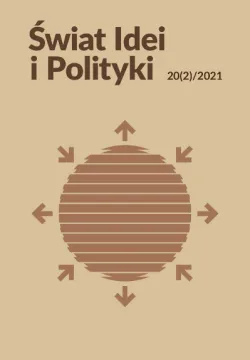Russian Strategic Thought
DOI:
https://doi.org/10.34767/SIIP.2021.02.07Keywords:
Russian Federation, security policy, military doctrine, foreign policy conceptsAbstract
Russia’s great-power ambitions are reflected in strategic documents, which, depending on the events affecting its security. These documents evolved and took on a more confrontational character, emphasizing Russia’s desire to in-troduce a new architecture of international security. The actions taken by Russia clearly demonstrate its ambitions to change the world order and order created after the collapse of the Soviet Union. The Russian authorities use a number of different tools in their actions, and military power is not necessarily the key factor.The article presents the Russian strategic thought which defines the main direc-tions of the Russian foreign and security policy. The reasons for changes in the ap-proach to the post-Cold War international order in the light of which changes were made to the “Concept of the foreign policy of the Russian Federation” were present-ed. The main goal of the concept was analyzed, which “persuades” the West to make concessions, thanks to which it would enable the end of the conflict with Russia on its terms and the re-normalization of mutual relations. The issue of the Russian understanding of geopolitics and the geopolitical code of the Russian Federation was raised. Documents of military doctrines closely related to the conducted pol-icy have been indicated. It should be emphasized that the new Military Doctrine of the Russian Federation is part of the entirety of Russian strategic thinking, which is aimed at revising the post-Cold War international order
References
Arbatov, A.G. (2 czerwca 2000). The transformation of Russian Military Doctrine: Lesson Learned from Kosovo and Chechny. The Marschall Center Papers.
ARMYRUS (2021). Основные приоритеты строительства ВС РФ.
Bączyk, N., Kwasek, T. (2018). Strategiczne Siły Nuklearne. Nowa Technika Wojskowa, 14.
Barabanow, M. (2012). Military reform: toward the new look of the Russian Army.
Biuro Bezpieczeństwa Narodowego (2015). NOTATKA BBN: Aktywność Rosji w Arktyce.
Bieleń, S. (2006). Tożsamość międzynarodowa Federacji Rosyjskiej. Warszawa: Oficyna Wydawnicza ASPRA-JR.
Cesarz, Z., Stadtmuller, E. (2000). Problemy polityczne współczesnego świata. Wrocław: Wydawnictwo Uniwersytetu Wrocławskiego.
CIA (2021). Russia overview.
Ciechanowski, R. (2018). Modernizacja techniczna marynarki wojennej FR. Lata 2008–2017. Nowa Technika Wojskowa 14.
CSIS (2016). Polityka zagraniczna Rosji.
Depczyński, M. (2015). Rosyjskie Siły Zbrojne. Od Milutina do Putina. Warszawa: Bellona.
Depczyński, M., Elak, L. (2020). Rosyjska sztuka operacyjna w zarysie. Warszawa: Fundacja Historia i Kultura.
Grabowski, T.W. (2011). Rosyjska Siła. Częstochowa: Instytut Geopolityki.
IISS (2017). The Military Balance 2016. London.
Kagan, R. (2009). Powrót historii i końcu marzeń. Poznań: Rebis.
Kara-Murza, A.A. (2002). Zmiana formuły tożsamości: Rosja między okcydentalizmem a samoistnością. W:A. Magdziak-Miszewska, M. Zuchniak, P. Kowal (red.), Polacy i Rosjanie. 100 kluczowych pojęć. Warszawa: Więź.
Kaszuba, M., Minkina, M. (2016). Imperialna gra Rosji. Warszawa: Rytm.
Kefeli, I.F. (2004). Sud’ba Rossii w globalnoj geopolitikie. Sankt-Petersburg: [b.w.].
Kokoshin, A. (2002). What is Russia: a superpower, a great power or a regional power. International Affairs: A Roussian Journal of World Politics, Diplomacy & International Relations, 48, 6.
Koziej, S. (2008). Strategiczne i polityczne koncepcje bezpieczeństwa USA i Rosji. Skrypt internetowy. Warszawa.
Kupiecki, R., Menkiszak, M. (2018). Stosunki NATO – Federacja Rosyjska w świetle dokumentów. Warszawa: Polski Instytut Spraw Międzynarodowych.
Legucka, A. (2013). Geopolityczne uwarunkowania i konsekwencje konfliktów zbrojnych na obszarze poradzieckim. Warszawa: Difin.
Liik, K. (2018). Wygranie normatywnej wojny z Rosją: audyt energetyczny UE-Rosja.
Mackinder, H.J. (1904). The Geographical pivot of history.The Geographical Journal, 4.
Mickiewicz, P. (2018). Rosyjska myśl strategiczna i potencjał militarny w XXI wieku. Warszawa: Wydawnictwo Naukowe PWN.
Morawski, G. (2005). Rosja/Władimir Putin: „Upadek ZSRR katastrofą”.
Naroclinitskaia, N. (2004). Russian in the new geopolitical context. International Affairs, 50.
Nartow, N.A., Nartow, W.N. (2007). Geopolitika. Moscow: Ynifi-Dana. OSCE (1999). Agreement on Adaptation of the Treaty on Conventional Armed Forces in Eu-rope. Organization for Security and Co-operation in Europe.
Panek, B. (2015). Polityka Federacji Rosyjskiej w regionie Europy, Azji i Pacyfiku. Warszawa: Difin.
Potulski, J. (2008). Społeczno-Kulturowy Kontekst Aktywności Międzynarodowej Federacji Rosyjskiej. Gdańsk: Wydawnictwo Uniwersytetu Gdańskiego.
Potulski, J. (2010). Współczesne kierunki rosyjskiej myśli geopolitycznej. Gdańsk: Wydawnictwo Uniwersytetu Gdańskiego.
Putin: Poglądy Cerkwi i Kościoła są zbieżne. (2007).
Rawiczandran, K. (1999). Geopolitika Rossii: istorija i sowriemiennost. Moscow: Unikum-tsentr.
Siemionow Tien-Szański, W. (2003). O moguszczestwiennom territorialnom wladenii primietielno k Rossii. W: D.N. Zamiatin (red.), Imperija prostranstwa. Chrestomati-ja. Moskwa: [b.w.].
Thornton, R. (2011). Military Modernization and the Russian Ground Forces. Carlisle Barracks.
Downloads
Published
Issue
Section
License

This work is licensed under a Creative Commons Attribution-NonCommercial-NoDerivatives 4.0 International License.

